SCAD Heart
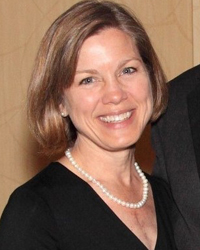 At age 38, after the birth of her second son, Katherine K. Leon had a heart attack. Atypical? Indeed. This young, physically fit woman had no risk factors associated with heart disease. She had a SCAD heart attack.
At age 38, after the birth of her second son, Katherine K. Leon had a heart attack. Atypical? Indeed. This young, physically fit woman had no risk factors associated with heart disease. She had a SCAD heart attack.
A Spontaneous Coronary Artery Dissection, SCAD is an extremely serious and often fatal condition. Here’s what happens. Coronary arteries, the arteries that feed the heart, have walls with 3 layers. With SCAD, the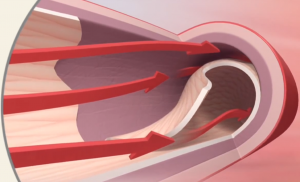 wall develops a tear, causing blood to flow between the layers of the wall. Pieces of the arterial wall can act as a flap or block the artery by clotting. The clot or flap stops the flow of blood to the heart muscle resulting in a heart attack or even sudden death. “Starved heart = dead tissue,” Katherine explains. Eighty percent of the people suffering from SCAD are women.
wall develops a tear, causing blood to flow between the layers of the wall. Pieces of the arterial wall can act as a flap or block the artery by clotting. The clot or flap stops the flow of blood to the heart muscle resulting in a heart attack or even sudden death. “Starved heart = dead tissue,” Katherine explains. Eighty percent of the people suffering from SCAD are women.
“It’s Not Your Heart”
Katherine’s SCAD heart attack happened on April 30, 2003. Told repeatedly by doctors, “it’s not your heart” catheterization and emergency double bypass surgery occurred Monday, May 5. In other words, Katherine did not receive essential treatment for her condition for 6 days. More damage to her heart occurred because of this.
Thankfully, Katherine survived. Describing her transformation from patient to advocate to initiator of research,
Katherine wondered, what caused this to happen to the walls of her coronary arteries? No one could answer that question. Told that what happened to her was rare and that no one knew other survivors, she discovered that, “No [one] I was meeting had ever even heard of SCAD.”
“What I kept hearing was, ‘There is no research because there isn’t anything to research. You either die, need a heart transplant, or are lucky like you.’ I was shocked and appalled by the unscientific attitude of these medical professionals.”
Katherine’s 6 Year Search For Other Survivors
Being told to “get over it, you’re lucky to be alive,” only stirred Katherine to action. Is there another young, healthy mother out there, surviving a SCAD heart attack?
No one seemed to know. She started to look with “zero support.”
“I didn’t find a single other SCAD survivor until January of 2007.”
She went online but it took 4 years to find another survivor. When she did, she started to ask questions and document what had happened to others. By fall of 2009 she had found 89 survivors worldwide.
Collecting Data
Realizing that “researchers want diagnosed bodies to study,” Katherine brought her data to the Women’s Heart Science and Leadership Symposium at Mayo Clinic in 2009. There she pitched her idea to Dr. Sharonne Hayes.
“As soon as I got home from Mayo, I posted…about Dr. Hayes’ positive reaction to…SCAD research…sent…my…proposal with data on the 22nd. She replied on the 28th. And by November 2, I was getting commitments from women…to participate.”
Dr. Hayes conducted a pilot feasibility study, started a virtual registry, and by 2011, launched a DNA biobank.
“From there, it has been a blur! Amazing progress! New developments all the time, makes it exciting.” Genetic research is underway through Mayo’s DNA biobank. Researchers are exploring SCAD heart in connections with hormonal changes, autoimmune disorders, lupus, sjogrens and connective tissue conditions, like Ehlers Danlos and FMD.
“SCAD Isn’t Rare…It’s Rare to Find a Survivor!”
But the most exciting fact is that now there is professional interest. “Doctors want to solve this mystery heart attack, not dismiss it as ‘too rare’ to matter. It wasn’t overnight!” Katherine states. But years of effort are paying off.
“[It] seems like SCAD heart is everywhere. [There’s a] ripple effect via Internet/Google[that] means new survivors and those diagnosed long ago, meet. Survivors [are] speaking out in media. Their coverage creates more. Doctors refer and consult; diagnose more SCAD heart. And repeat!”
SCAD Alliance
Now Katherine has engaged in another initiative with Rachel Douchette.
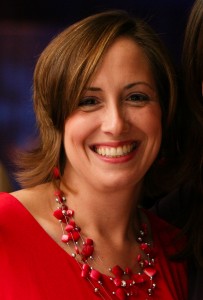 While putting her children in the car for school, Rachel felt “sudden crushing chest pain.” A typical morning in 2011 became an emergency.
While putting her children in the car for school, Rachel felt “sudden crushing chest pain.” A typical morning in 2011 became an emergency.
“My MI (myocardial infarction or heart attack) was dismissed initially because I was too young, [about to turn 36] too healthy and female. Bias and lack of awareness of SCAD caused delay in diagnosis and treatment…I survived with emergency CABG.” (Coronary Artery Bypass). Once a survivor, I needed to help increase awareness of SCAD and that heart attacks happen to young women. I shared my SCAD story with Heart Massachusetts and then as Massachusetts Regional Go Red spokeswoman.””
Katherine and Rachel met online in the same WomenHeart Inspire support group where Katherine started reaching out to others in 2004. They kept in touch and discovered they shared the same mission founding SCAD Alliance. The goals of their organization are first, to assist and accelerate interdisciplinary collaborations in order to expand and better the care and outcomes of SCAD.
“Collaboration is fundamental to the SCAD Alliance philosophy,” Rachel states. The logo for the organization is a “4-leaf ‘lucky’ 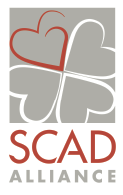 heart logo that represents the torn artery we must overcome with support from family, health partners, researchers.”
heart logo that represents the torn artery we must overcome with support from family, health partners, researchers.”
To create this collaborative strategy they have built a team to study SCADs from all angles and integrated disciplines.
Second, SCAD Alliance wants patients to be empowered. “We are committed to improving lives of SCAD heart patients and families through education, advocacy, research and support,” Rachel said. Finally, SCAD Alliance wants to spread awareness of SCAD.
Long-term Impacts of SCAD Heart
One powerful reason for this push forward is “We are seeing long-term impacts of SCAD now. Heart failure, arrhythmias, serious consequences years after the event…Or, I should say, at the time of event. Many have severe damage and struggle with heart failure from year one,” Katherine states. Rachel agrees that it is important that heart attack symptoms “are not dismiss[ed] in healthy people. The medical community must have the awareness to consider SCAD.”
“SCAD Alliance has the vision of the day when no one endures the heartbreak of SCAD heart.”-Rachel Douchette
Based on the #HCHLITSS tweet chat March 27, 2014.

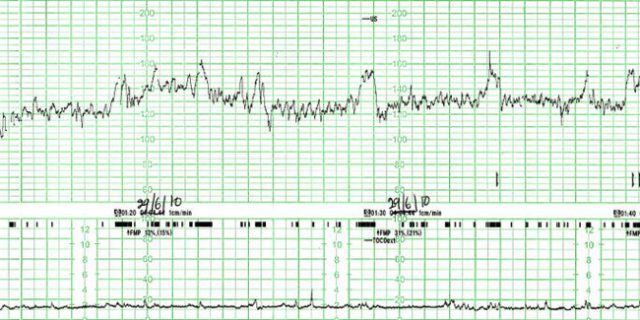





Nice to meet you! I had a beautiful baby boy April 18, 1989. He’s doing well, thanks. Turning 25 this friday. Same thing happened to me. No real explanation until recently. I’m blessed with generally good healthy. I do have a ICD and my activity level is well above what they predicted it would be. I have concerns that this may be passed on to my son or even may nieces. I live in Maine and would invite any conversation you would like to have.
Thank you. Janet Peruffo
Hi Janet, nice to meet you too! It is wonderful to hear that your son is turning 25, and you are feeling well and active. I would love to hear more of your story and about your experience with an ICD. You are an inspiration to the newly diagnosed!
If you’d like to learn more about SCAD Alliance and get in touch by email, our links are http://www.scadalliance.org or, if you like facebook:
https://www.facebook.com/pages/Spontaneous-Coronary-Artery-Dissection-SCAD-Alliance/229928783729665
As you say, many of us are concerned about a genetic link, but fortunately there is research underway … so hope for an answer.
Thanks for posting and I look forward to chatting again!
Katherine
I am just blown away by the amount of information available now compared to just 5 years ago! It is due in part to woman just like you who have rallied on behalf of those who experienced SCAD and felt so completely alone, myself included. I am 46 yrs. old, live in Maine, the mother of 4 kiddos. After the birth of #4 in 2009, I had a heart attack called “SCAD.” What?? What in the world is SCAD?? No one really seemed to know, making an already TERRIFYING experience that much more frightening. Thankfully, the doc in the ER that night suspected what was happening..No risk factors..had given birth recently.. so he rushed me to cath lab and confirmed his suspicion. But, he still wasn’t sure how to treat. He stopped procedure and consulted with a doc in Boston. No stent, no bypass. He ballooned open my collapsed, dissecting artery..and left it, hoping the blood flowing through it again would keep it that way while it healed. 5 years out, and aside from unexplained chest pains, I am a healthy survivor. So many woman are sent home. So many are told it’s gastrointestinal or stress related. Thank you! For telling your stories, gathering information and bringing SCAD survivors together. ♡♡♡
Sincerely, Tess Howe
Hello Tess! It’s nice to meet you and so glad that your recovery was successful. Congrats on 5 years! I’m wondering if your doc consulted Massachusetts General Hospital in Boston. There is now SCAD research underway there, as well as at Mayo Clinic. Dr. Malissa Wood is the Harvard cardiologist leading the MGH study if you hear of other New Englanders in need.
We recently launched this brief video, which covers many of the themes you just mentioned. Please enjoy and share!
http://youtu.be/Sc4OtPCWd74
Hi Katherine,
My name is Katrina. My sister Diana was admitted into the hospital three days ago for heart problems and yesterday was told it was due to SCAD. She is only 23 years old and gave birth to twin girls 3 months ago. Before being admitted to the hospital a few days ago, she made several trips to the hospital for chest pains and each time was turned away. We feel blessed that she finally knows what’s happening with her heart but also are VERY afraid of the seriousness of this condition and the length of time that has passed since she was having pain, to finally having a diagnosis. Family is at her bedside every step of the way and I have been researching aimlessly for information. I am so thankful to find your story and read your testimony. Thank you for advocating for young women like my sister.
Blessings to you.
Concerned Sister
Katrina, I am so glad that you have found this post and are looking for guidance and help. There is an organization called SCADAlliance that Katherine Leon has started and I am fortunate to be on its Board. There is an active SCADAlliance Facebook page and we are discussing other social media outreach. Please check out SCADAlliance. Here is a link to their most recent explainer video.
Katrina,
Hello! I’m so glad Kathleen responded with additional information for your family. How is your sister? Reading her story brought back many memories! Hopefully you’ve had a chance to see some of the current material and share it with her doctors if necessary. You could also call Mayo and request a phone consult with Dr. Hayes if you feel your sister’s doctor needs more guidance about SCAD.
It is such a challenging spot to be in but you have already identified the best medicine for your sister, and that is the support of all of you! She will need a lot of physical and emotional help in the year ahead. Please insist that her doctor arrange for her to attend cardiac rehab when she is cleared for activity. It is a “must do” to get her back on her feet and feeling confident as soon as possible.
I hope she and the babies are doing well. Thank you for sharing this touching story!
I’m glad to say I’m a SURVIVOR of SCAD. A lot of anxiety finding out how little is known about this. My story: Oct 4, I developed chest pains. They weren’t really sharp pains, more of a dull pressure in the middle of my chest. After breaking out into a cold sweat and vomiting twice, I woke up my fiancé. He called 911, after hooking me up to the ekg I was rushed to the hospital in the back of the ambulance. Within 10 minutes of my arrival, I was in the Cath Lab being prepared for an angiogram. The angiogram showed a tear in the coronary artery; and, I’d be placed in ICU for a few days to see how the tear responded to medication. I was informed that there’s a chance of bypass surgery or stent placement. On Wednesday Oct 7th, my second angiogram was done. After staring at the screen for a several minutes, my cardiologist said, “Huh, it healed”! He told me that I wouldn’t have to get a stent or have surgery because the tear healed. I was discharged a few hours later, once my tr band was able to be safely removed. Since getting home, I have returned to an almost normal life. I am a little weak and tired. But that is subsiding every day. I know it’s a miracle I survived, didn’t have surgeries/stents, and I’m back on my feet and doing things ( e.g. Laundry in the washing center down 2 flights of stairs yesterday 10/10)
Hello. I am post scad of the lad.this is my second discection. I had my first one when I was 42. I am now 55. . I am looking for answers. First time they called it a fluke. I ended up havin 3 more alert attacks when I was 46 mild. Then 2 weeks ago I had a heart attack sent to cath lab and no blockage. Triponin and myglobin were elevated . Climbed to 6., before declining The next night while Layin in the hospital bed I began to have my second disection. This time triponin 83. I am looking for help answers something
Any advice help would be so deeply appreciated.
Ann, I would highly recommend your being in contact with SCAD Alliance and Spontaneous Coronary Artery Dissection SCAD Alliance Facebook. Please ask for help on the Facebook page. That page is monitored by Katherine Leon. SCAD Alliance has a medical advisory board of the TOP Physicians in the world who are working on SCAD. They can provide you with the most recent and advanced information on spontaneous coronary artery dissection. I will also give Katherine a heads-up on your question. Best, Kathleen
Hi Kathleen,
Thanks so much for the kind words and the heads up. You are appreciated more than you know!
K
Thank you for commenting and helping so many people with your advocacy on Spontaneous Coronary Artery Dissection. Kathleen
Hi Ann,
I’m very sorry to hear that you’ve experienced a second SCAD. I can relate to your frustration at being told it’s a “fluke,” when in fact, you are having a difficult time. Depending where you live, it’s possible you could see one of the SCAD researchers. There are studies in the UK, Canada, and several locations in the U.S. Here is a link to a list: http://scadalliance.org/clinical-trials/
If you haven’t already, please do check out the website for information and support. There are online groups and I can try to find you a local SCAD survivor to connect with also.
I hope this finds you feeling well,
Katherine
I’m so glad I found this website! I recently celebrated my 45th birthday and within a week I was in the hospital where I was told my artery wall collapsed. I’m still in shock, anxious it will happen again and just missing how I felt before this. My body is trying to adjust to five medicines and I feel physically limited (I used to be quite physically active and now stairs are tiring). I felt very alone but from reading this – I realize I’m not, thank you for putting this SCAD site together!
Katherine Leon is instrumental in the SCAD Alliance. Their Facebook page Spontaneous Coronary Artery Dissection (SCAD) is also a resource for you. Katherine and others respond to your questions and concerns. I’m so glad that this post helped you! Best, Kathleen
I had a SCAD heart attack after giving birth to a baby girl two weeks ago. I only have 30 percent heart function right now. I wonder if I will recover some of my function in cardiac rehab. I have plenty to live for.
Dear Marilyn. First of all, congrats on your new baby girl! There is life after SCAD. I too had very low ejection fraction and 32 years later it’s still only 25% but I function very well. I work, ride bike, daily chores and our son is 32 yr old now. I know it is very difficult now. Hugs to you. xxoo Janet